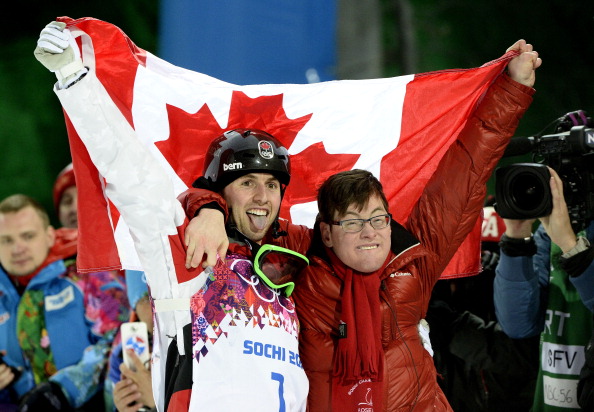As I have always had an interest in the background life stories of Olympians, I decided to do some research on interesting media coverage of the Sochi 2014 Olympians’ personal lives. What I found were some heart-touching stories of brothers skiing for another sibling who cannot participate in the Olympics due to a disease, or skater who suffered through injuries and trained hard to be able to participate this year. However, I also found a number of articles that talked about how many of these stories were over exaggerated or blown out of proportion only for the media, many TV channels using it in perhaps an “exploitative” way. However, people seem to thrive off the media playing with their emotions, and these (relatively) true-life stories of talented athletes give the media an easy way to take advantage of this.
In one popular article (http://www.salon.com/2014/02/11/sochi_olympics_a_skiers_tearful_win_a_skaters_shocking_loss/), it describes how NBC concentrated its show on one skier, Alex Bilodeau, who was aiming for a 2nd gold medal, but also focused in on his deep care for his brother who suffers from cerebral palsy. NBC shows the skier making his way down the ski run for the win, and then immediately hugging his brother and crying. However, the show ignores every other participant in the race, including those others who placed, and simply concentrates on the emotional celebrations of the two brothers. One must question at these kinds of situations (as the article also brings up) if the brother’s disability is being overly exaggerated and the scene overly emotional, made more for the media than being actually genuine. It is sometimes hard to say, but it is interesting to think about how these life stories can be tweaked in order to attract attention.
The Olympics also seems to misrepresent the personal feelings of the Olympic participants, such as when NBC introduced the famous snowboarder Shawn White and announced that he will compete in the half-pipe on Tuesday night. The commentator speaks for him, saying he is a bit nervous about the competition, due to his recent injury and unfavorable snow conditions from the warm weather in Sochi. However, this can also be seen as simply a way to try to convince to audiences to watch on their showing that night and make the event more suspenseful.
In another article (http://www.salon.com/2014/02/14/sochi_olympics_a_skater_recovers_a_skier_drops_his_pants/), it talks about the introduction by NBC of the Russian figure skater Evgeni Plushenko, which completely ignores his past back damage and surgery, only talking about him being one of Russia’s most “spectacular skaters.” However, when the skater came on the ice and took a fall, lifting his shirt to expose the surgery scar and looking deeply in pain, it did seem a bit “faked,” but apparently he was in enough pain to withdraw himself from the competition for good. That said, the lack of exposure of Plushenko’s injury and high chance of taking a spill on the ice, made his fall and his dramatic exit of the competition even more surprising to NBC’s audience. This just shows another way the media plays around with Olympic player’s life stories in order to entertain their audience.
Reading these articles, I found it interesting how these different tactics of “faking it”, by both over-exaggerating a situation and leaving important information out about Olympians and their life stories are both used in the media. It just further exemplifies the uses of life narratives and how they can be manipulated.


You introduce a critical interpretation of the Olympics event as an instance of media representation. The coverage quite evidently, as you supported, over-exaggerates life stories of certain Olympians to create a more touchy, emotional energy of the event to stir public affection and therefore attraction. Making the public “fall in love” with these people keeps them attached to their story and ultimately hope they achieve success, thus making the public audience rely on the media in hopes to fulfill their wishes. I agree that in this way the media puts itself into a life narrative role, as it is very selective on its weight of emphasis and inclusion of certain people and stories. Over time, the accumulation of this pattern of media coverage of the Olympics overall constructs a universal lens of how the public perceives, reacts, and responds to this event. Patterns can also be seen with other events such as murders, as Jiwani and Young both talked about, which tend to over-exaggerate on the evilness and violent behaviour of the murderer, but less about the victim. This has over time distracted the public of the supposed importance of lives being lost and the grief that comes with these events. Media manipulation can powerfully alter people’s feelings and experiences with things.
I think you raise a very pertinent point when questioning the role and the tactics that news outlets use to “fake it”. As you mention, the over exageration of atheletes back stories play a major role in the representation of the Olympics through mainstream media. This over exaggeration helps to frame the athelete and create a certain persona that is recognized by the general public. As you mention, in the case of Alex Bilodeau, we directly associate him with his love for his brother and for the inspirational role he plays in Bilodeau’s life. While a case could be made for the “faking” or exaggeration of this story, I believe that the way in which the public perceives Bilodeau’s love for his brother is more a result of how the media frames his life and the persona that surrounds him. In doing so, the media both takes away and gives voice to the athelete. As with the case of Shawn White, the media spoke on behalf of the athelete, artificially giving him a voice. However, it appears, far more frequently, that the media representation of atheltes auto/biography gives voice to a person or group that would not normally have the occasion to speak.